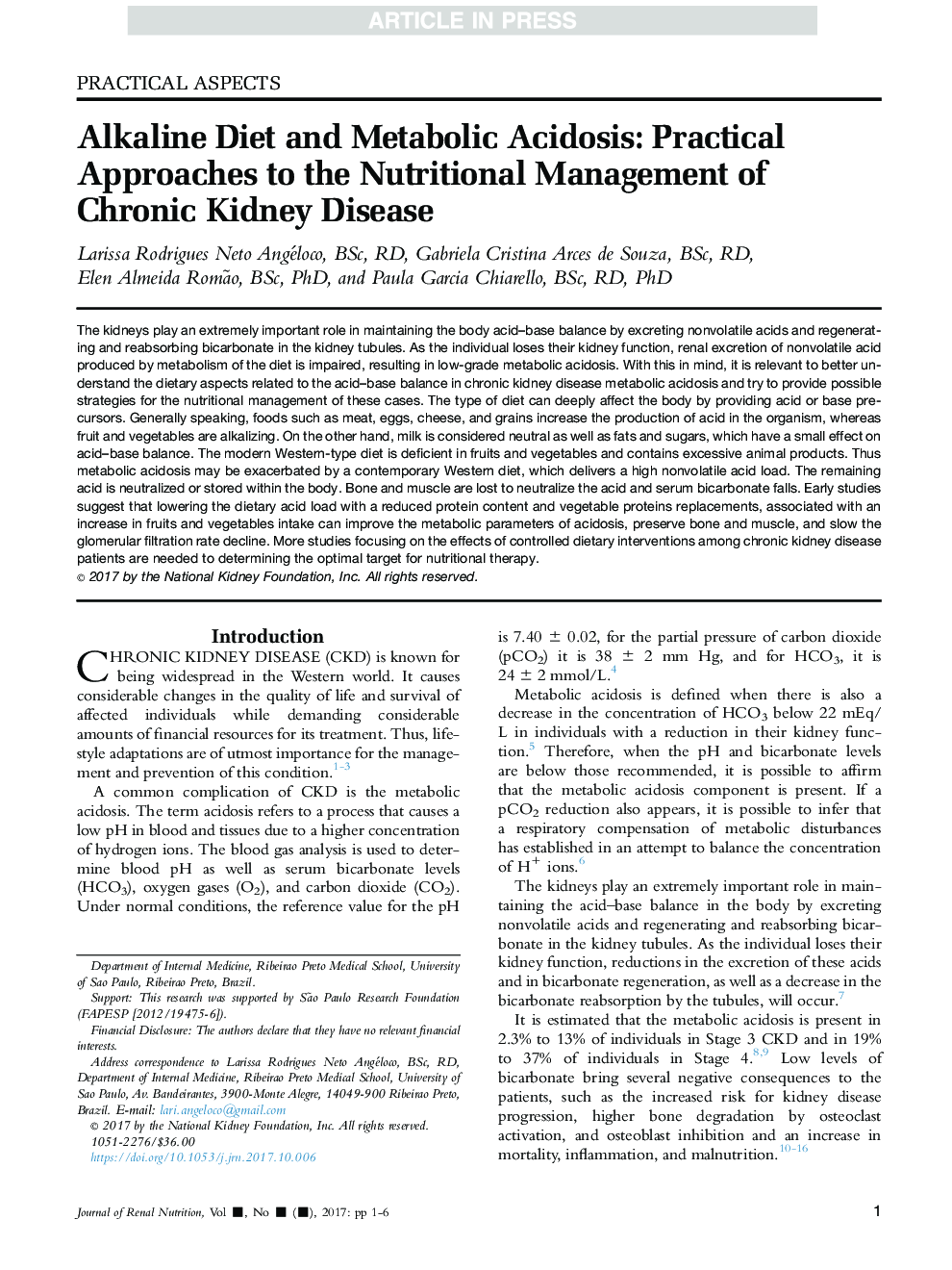| کد مقاله | کد نشریه | سال انتشار | مقاله انگلیسی | نسخه تمام متن |
|---|---|---|---|---|
| 8770291 | 1598575 | 2018 | 6 صفحه PDF | دانلود رایگان |
عنوان انگلیسی مقاله ISI
Alkaline Diet and Metabolic Acidosis: Practical Approaches to the Nutritional Management of Chronic Kidney Disease
ترجمه فارسی عنوان
رژیم قلیایی و اسیدوز متابولیک: رویکردهای عملی برای مدیریت تغذیهای بیماری مزمن کلیه
دانلود مقاله + سفارش ترجمه
دانلود مقاله ISI انگلیسی
رایگان برای ایرانیان
ترجمه چکیده
کلیه ها نقش بسیار مهمی در حفظ تعادل اسید و پایه بدن با دفع اسید های غیر قابل انفجار و بازسازی و دفع جذب بی کربنات در لوله های کلیه دارند. همانطور که فرد عملکرد کلیه خود را از دست می دهد، دفع کلیوی اسید غیرقابل تحمل تولید شده توسط متابولیسم رژیم غذایی کاهش می یابد و منجر به اسیدوز متابولیک پایین می شود. با در نظر داشتن این موضوع، بهتر است درک جنبه های رژیم غذایی مربوط به تعادل اسید-پایه در بیماری متابولیک اسیدوز بیماری مزمن کلیه و تلاش برای ارائه راه های ممکن برای مدیریت تغذیه در این موارد. نوع رژیم غذایی می تواند با ایجاد پیش سازهای اسید یا پایه بدن را به شدت تحت تاثیر قرار دهد. به طور کلی، غذاها مانند گوشت، تخم مرغ، پنیر و دانه ها تولید اسید را در ارگانیسم افزایش می دهند، در حالیکه میوه ها و سبزیجات قلیایی می کنند. از سوی دیگر، شیر نیز به عنوان خنثی و همچنین چربی ها و قندهای محسوب می شود که اثر کوچکی روی تعادل اسید-بنزین دارند. رژیم مدرن غربی نوعی کمبود میوه ها و سبزیجات دارد و حاوی محصولات حیوانی بیش از حد است. بنابراین، اسیدوز متابولیک ممکن است توسط یک رژیم غذایی معاصر غربی تقویت شود، که باعث می شود بار اسید غیرقابل تحمل بالا باشد. اسید باقی مانده خنثی یا درون بدن ذخیره می شود. استخوان و عضله برای از بین بردن اسید و بی کربنات سرم سقوط می کنند. مطالعات اولیه نشان می دهد که کاهش بار اسید رژیم با کمبود پروتئین و جایگزینی پروتئین های گیاهی، همراه با افزایش مصرف میوه ها و سبزیجات می تواند پارامترهای متابولیک اسیدوز را بهبود بخشد، حفظ استخوان و عضله و کاهش سرعت فیلتراسیون گلومرولی. مطالعات بیشتر با تمرکز بر اثرات مداخلات غذایی رژیم کنترل شده در بیماران مبتلا به بیماری مزمن کلیه برای تعیین هدف مطلوب برای درمان تغذیه ضروری است.
موضوعات مرتبط
علوم پزشکی و سلامت
پزشکی و دندانپزشکی
بیماریهای کلیوی
چکیده انگلیسی
The kidneys play an extremely important role in maintaining the body acid-base balance by excreting nonvolatile acids and regenerating and reabsorbing bicarbonate in the kidney tubules. As the individual loses their kidney function, renal excretion of nonvolatile acid produced by metabolism of the diet is impaired, resulting in low-grade metabolic acidosis. With this in mind, it is relevant to better understand the dietary aspects related to the acid-base balance in chronic kidney disease metabolic acidosis and try to provide possible strategies for the nutritional management of these cases. The type of diet can deeply affect the body by providing acid or base precursors. Generally speaking, foods such as meat, eggs, cheese, and grains increase the production of acid in the organism, whereas fruit and vegetables are alkalizing. On the other hand, milk is considered neutral as well as fats and sugars, which have a small effect on acid-base balance. The modern Western-type diet is deficient in fruits and vegetables and contains excessive animal products. Thus metabolic acidosis may be exacerbated by a contemporary Western diet, which delivers a high nonvolatile acid load. The remaining acid is neutralized or stored within the body. Bone and muscle are lost to neutralize the acid and serum bicarbonate falls. Early studies suggest that lowering the dietary acid load with a reduced protein content and vegetable proteins replacements, associated with an increase in fruits and vegetables intake can improve the metabolic parameters of acidosis, preserve bone and muscle, and slow the glomerular filtration rate decline. More studies focusing on the effects of controlled dietary interventions among chronic kidney disease patients are needed to determining the optimal target for nutritional therapy.
ناشر
Database: Elsevier - ScienceDirect (ساینس دایرکت)
Journal: Journal of Renal Nutrition - Volume 28, Issue 3, May 2018, Pages 215-220
Journal: Journal of Renal Nutrition - Volume 28, Issue 3, May 2018, Pages 215-220
نویسندگان
Larissa BSc, RD, Gabriela Cristina BSc, RD, Elen BSc, PhD, Paula BSc, RD, PhD,
